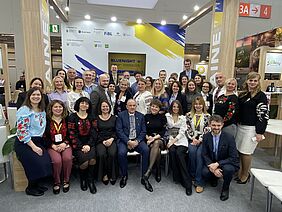(Frick, 23.02.2024) Two years ago this Saturday, Russia invaded Ukraine, putting the brakes on the booming development of the organic market. Nevertheless, farmers and processors in areas not directly or only marginally affected by the war are continuing to work intensively on building up production and markets.
The third most important exporter to the EU
A few days ago, the latest figures were presented at Biofach, the world's leading trade fair for the organic sector. The majority of these figures were from 2022 and showed some trends for Ukraine. In the domestic market in particular, demand fell sharply due to declining purchasing power. However, this decline was partially offset by increased exports.
The figures are as follows:
- The area under organic cultivation in Ukraine in 2022 was still just over 263,000 hectares. The decline compared to the previous year (422,299 ha) was, therefore, around 38 percent.
- The value of Ukrainian organic exports remained practically stable despite the war: they totalled USD 219 million in 2022, compared to USD 222 million in the previous year.
- At the same time, the value of Ukrainian organic exports to the EU and Switzerland rose by 14.6 percent to USD 191.5 million in 2022, compared to USD 167.2 million in 2021. Ukraine exported 225,800 tonnes of organic products to the EU and Switzerland in 2022. This corresponds to an increase of 13 percent compared to 2021 (200,200 tonnes).
- This made Ukraine the third most important supplier of organic products and feed to the EU in 2022, which is mainly due to the increasing deliveries of soya beans, wheat and maize.
- Unfortunately, this was followed by a marked slump in organic exports in 2023: the export volume to the EU and Switzerland fell from US$ 121 million (from January to August 2022) to US$ 57.1 million in the same period in 2023.
- Domestic consumption of organic products fell by 52 percent in 2022 compared to 2021 due to the war.
Forty exporters at the Biofach in Nuremberg
However, the Ukrainian organic sector is not letting these setbacks keep it down. It has just been represented with a national stand at Biofach in Nuremberg for the 11th time in a row. Around forty exporters from the Ukrainian organic sector presented their products there – accompanied by a high-ranking political delegation (see also FiBL media release from 8 February 2024).
Under the auspices of the Ukrainian Ministry of Agrarian Policy and Food (MAPF), the Ukrainian presence at Biofach was supported by several partners, including the Swiss-Ukrainian Quality Food Trade Program (QFTP) and the German-Ukrainian Partnership in Organic Agriculture (COA). The QFTP is managed by FiBL and funded by the Swiss State Secretariat for Economic Affairs (SECO). The aim of the project is to promote sustainable trade and create jobs in organic farming and the dairy sector in Ukraine. "The fact that SECO decided to extend the project by four years in the middle of the war was an important sign and great support for everyone involved," says QFTP Program Director Tobias Eisenring.
This is all the more significant given that Ukraine has recently faced increased pressure from European countries and their producer representatives. Some of them criticise the fact that Ukrainian exports are jeopardising domestic production. At the same time, Ukraine is increasingly reliant on European export markets, as overseas trade routes are more difficult or no longer possible due to the war.
More important role for women in the organic sector
One of the important effects of the war are the greatly increased demands on women working in the Ukrainian organic sector. At an event on the role of women in Ukrainian organic farming at the Biofach Congress, a gender study by Organic Initiative Ukraine showed that there is still a lot of potential here. As in many Western countries, the majority of decision-makers are still men (66 percent of company owners and 73 percent of management board members are male). Meanwhile, women hold the majority of lower-ranking technical specialists.
However, the absence of many men due to the war has now given significantly more women the opportunity to take on more responsible roles. However, these improvements must now also be supported by increased training for women, said Olena Deineko from Organic Initiative Ukraine at the presentation of the gender study.
Further information
FiBL contacts
- Tobias Eisenring, Program Director QFTP, FiBL Switzerland
- Adrian Krebs, Media spokesperson FiBL Switzerland
Links
- qftp.org: Quality Food Trade Program
- organicinitiative.org.ua: Gender Study "Gender balance in the organic sector in Ukraine is better than in the overall agricultural sector"
Videos
- youtube.com: Video "Organic trade in times of war: Women at the forefront of Ukrainian-Swiss Cooperation"
- coa-ukraine.com: Video "At the Front Line – Women in Ukraine are Changing the World"
QFTP project on market development in the Ukrainian organic sector
The Research Institute of Organic Agriculture FiBL has been active in various development projects in Ukraine since 2005, all funded by the State Secretariat for Economic Affairs (SECO). The Quality Food Trade Program (QFTP) project has been running since 2019 and was extended in July until 2026. The aim of the project is to promote sustainable trade and create jobs in organic farming and the dairy sector in Ukraine. Small and medium-sized enterprises in the organic and dairy sector are supported. https://qftp.org






